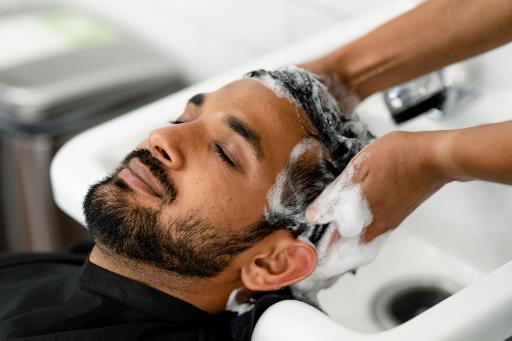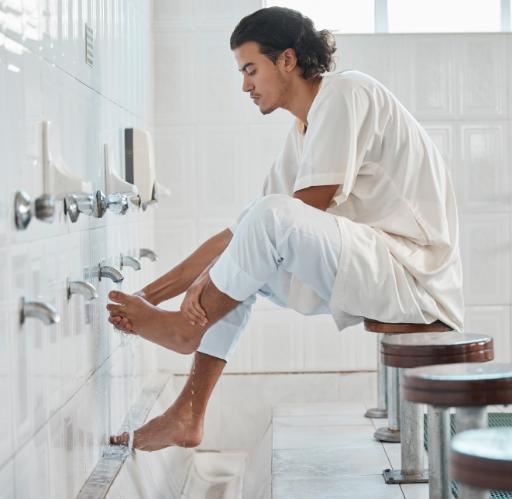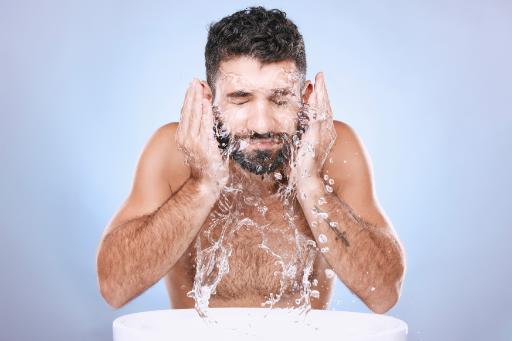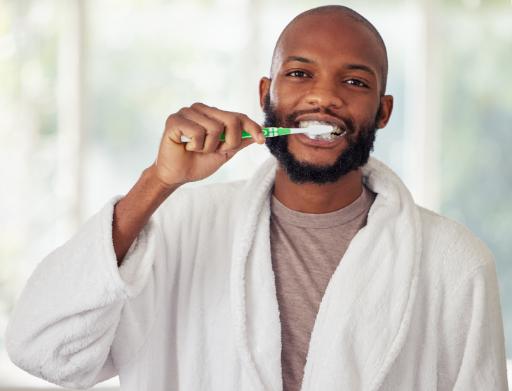The Joy of Showers: More Than Just Routine
A Daily Ritual for Holistic Health
Showers are not just about hygiene; they’re a daily ritual that can have profound effects on both physical and mental well-being. The act of showering can serve as a moment of solitude and reflection, offering a break from the hectic pace of life. It’s a time when you can wash away not just the grime of the day but also let go of stress and anxiety.

The Therapeutic Power of Water
The therapeutic power of water has been recognized for centuries. A good shower can stimulate the body’s healing processes, easing muscle tension and promoting relaxation. The sensation of water on the skin can be incredibly soothing, providing a form of hydrotherapy that can help to alleviate symptoms of conditions like anxiety and depression.
Boosting Immunity and Recovery
Regular showers, especially cold ones, can boost your immune system. The shock of cold water on the body can increase white blood cell count, helping to fight off illnesses. Additionally, alternating between hot and cold water can improve circulation, speeding up recovery and reducing muscle soreness after exercise.
Skin and Hair Health
While there are concerns about showering too frequently, moderate showering can actually benefit your skin and hair. It helps in maintaining the balance of oils, preventing acne, and keeping the scalp clean. Using gentle, natural products can enhance these benefits, leaving your skin and hair healthy and vibrant.
A Moment for Mindfulness
Taking a shower can also be a moment for mindfulness. It’s an opportunity to be present, to feel the water, and to listen to its sound. This mindfulness can lead to a clearer mind, better focus, and an overall sense of calmness.
Hair Wash: Your Crown’s Best Friend
Understanding the Necessity of Regular Hair Cleansing
Regular hair wash is essential for maintaining the health of your hair and scalp. It’s not just about removing visible dirt; it’s about clearing away the daily accumulation of sebum, sweat, styling products, and environmental pollutants. These can all contribute to a range of hair and scalp issues if not regularly cleansed.

The Science Behind Hair Wash
When you wash your hair, you’re not only cleaning the strands but also revitalizing your scalp. The scalp is skin, after all, and it benefits from exfoliation to remove dead skin cells and promote healthy hair growth. A clean scalp is a fertile ground for hair follicles, leading to stronger and potentially faster hair growth.
Balancing Hair Health
While hair wash is important, it’s equally important to find the right balance. Over-washing can strip your hair of its natural oils, leading to dryness and breakage. Conversely, under-washing can leave your hair greasy and could exacerbate scalp conditions such as dandruff. The key is to understand your hair type and wash frequency that maintains its natural balance.
The Role of Hair Products
Choosing the right shampoo and conditioner is crucial. Look for products that match your hair type and address any specific concerns you may have, such as color protection or volume enhancement. Remember, the right products can make a significant difference in the health and appearance of your hair.
Don’t Forget to Wash Your Feet
The Foundation of Good Health Starts with Your Feet
Washing your feet is a fundamental aspect of personal hygiene that is often overlooked. Yet, it plays a crucial role in maintaining overall health. Our feet are the workhorses of our bodies, carrying us through our daily activities, and they deserve the same attention we give to the rest of our bodies.

The Benefits of Washing Your Feet Regularly
- Prevents Infections: Regular washing helps prevent fungal infections like athlete’s foot, which thrive in the moist environments between our toes.
- Reduces Odor: Feet have numerous sweat glands, and without proper cleaning, they can harbor bacteria that cause unpleasant odors.
- Promotes Circulation: Massaging your feet while washing them can improve blood circulation, leading to better foot health and reduced discomfort from conditions like neuropathy.
- Enhances Skin Health: Keeping your feet clean prevents the build-up of dead skin cells, which can lead to calluses and corns.
How to Wash Your Feet Effectively
- Use Warm Water: Begin by soaking your feet in warm water to soften the skin and prepare it for cleaning.
- Choose the Right Soap: Use a gentle, non-irritating soap to cleanse your feet. Harsh soaps can strip the skin of natural oils, leading to dryness.
- Scrub Gently: Pay special attention to the soles of your feet and the spaces between your toes. Use a soft-bristled brush or washcloth to gently scrub these areas.
- Rinse Thoroughly: Make sure to rinse off all soap to prevent any residue that could cause irritation.
- Dry Completely: After washing, dry your feet thoroughly, especially between the toes, to prevent moisture from creating a breeding ground for bacteria.
The Spiritual and Mental Aspect of Foot Washing
In many cultures, washing feet also has a spiritual and mental significance. It symbolizes cleansing and purification, promoting a sense of tranquility and grounding.
How to Wash Your Face
The Importance of a Clean Canvas
Washing your face is the cornerstone of a good skincare routine. It’s the first step towards a healthy complexion and sets the stage for the rest of your skincare products to work effectively. By removing the accumulation of oils, dirt, and dead skin cells, you’re not only preventing clogged pores and acne breakouts but also enhancing your skin’s ability to repair and renew itself.

The Benefits of Proper Face Washing
- Maintains Clear Skin: Regular cleansing helps to maintain the proper balance of your skin’s natural oils and prevents the overproduction of sebum, which can lead to acne.
- Anti-Aging Effects: Removing pollutants and unwanted particles from your skin can slow down the aging process, reducing the appearance of wrinkles, pigmentation, and dullness.
- Promotes Hydration: Keeping your face clean helps maintain the skin’s moisture level, preventing dryness and promoting a supple, more youthful appearance.
- Boosts Product Efficacy: Clean skin allows for better absorption of skincare products, making them more effective in treating your skin concerns.
How to Wash Your Face Correctly
- Choose the Right Cleanser: Select a cleanser that’s suitable for your skin type—whether it’s oily, dry, sensitive, or combination.
- Use Lukewarm Water: Hot water can strip your skin of its natural oils, while cold water won’t effectively remove dirt. Lukewarm water is just right.
- Gentle Application: Apply the cleanser using gentle, circular motions. This helps to lift and remove dirt without irritating the skin.
- Rinse Thoroughly: Make sure to rinse off all the cleanser to avoid residue that could irritate your skin or block pores.
- Pat Dry: After rinsing, pat your skin dry with a clean towel. Avoid rubbing, as this can cause irritation.
When to Wash Your Face
- Morning: To remove oils that have accumulated overnight and to prepare your skin for your daytime skincare routine.
- Evening: To cleanse away makeup, sunscreen, and the pollutants that have built up throughout the day.
- After Sweating: Sweat can trap dirt and bacteria, so it’s important to wash your face after heavy perspiration to prevent breakouts.
What Happens If You Don’t Brush Your Teeth
Not brushing your teeth can lead to a variety of dental and health problems. Here’s a timeline of what could happen:
- Short-term: Within 48 hours, dental plaque can start to decalcify dentin, the protective material underneath the enamel, leading to weakened tooth enamel and bad breath.
- Long-term: If you continue not to brush, you may develop cavities due to the bacteria in plaque attacking the enamel. This can progress to gingivitis, an inflammation of the gums, which can then turn into periodontitis, a severe infection that affects the bones supporting your teeth and can cause tooth loss.
- Overall Health: Poor oral hygiene has been linked to an increased risk of heart disease, dementia, and other serious health conditions.
It’s essential to brush your teeth at least twice a day to maintain good oral health and prevent these issues.

How Long Are You Supposed to Brush Your Teeth
You should brush your teeth for two minutes, twice a day. This duration is recommended by the American Dental Association to ensure effective plaque removal and to maintain good oral health. Remember, spending less than two minutes may not remove as much plaque, and proper brushing technique is just as important as the duration.
How Many Times a Day Should You Brush Your Teeth
You should brush your teeth twice a day, once in the morning and once in the evening before bed. This is the recommendation from the American Dental Association to ensure the removal of plaque and to maintain good oral health. It’s also important to use fluoride toothpaste and a soft-bristled brush for the best results. Remember, in addition to brushing, it’s crucial to clean between your teeth daily with floss or an interdental cleaner to remove plaque and food particles that brushing alone can’t reach.







